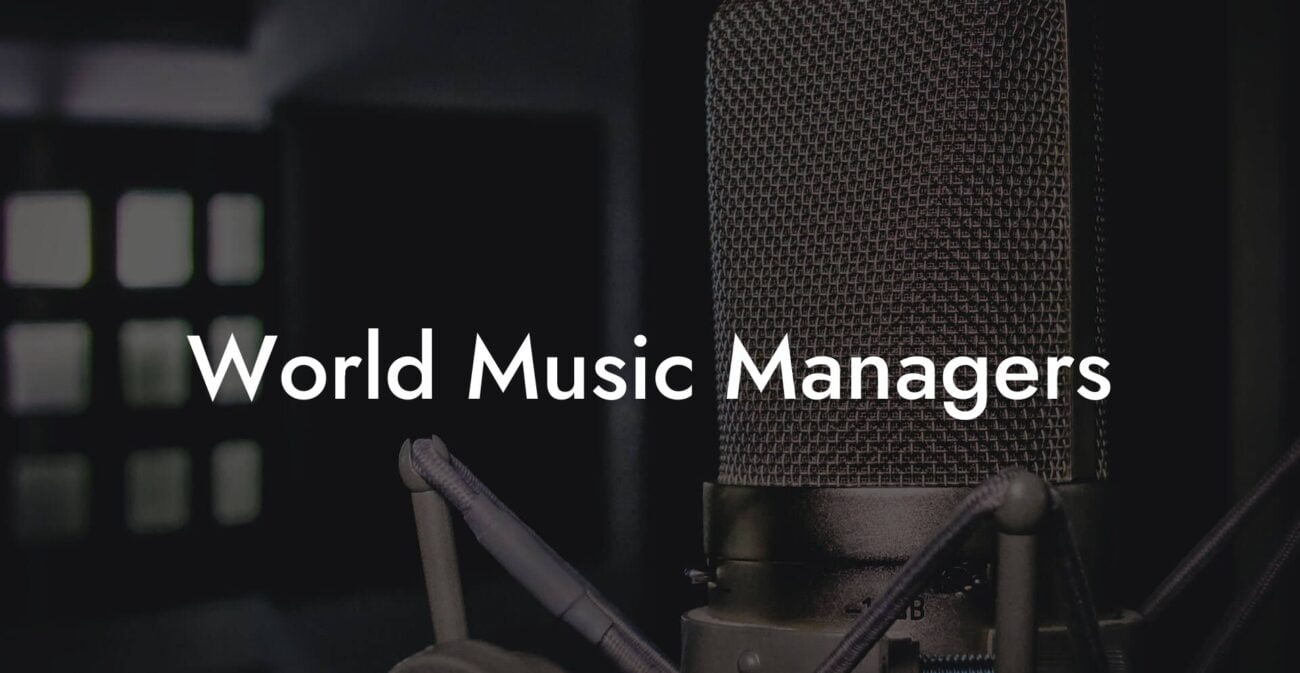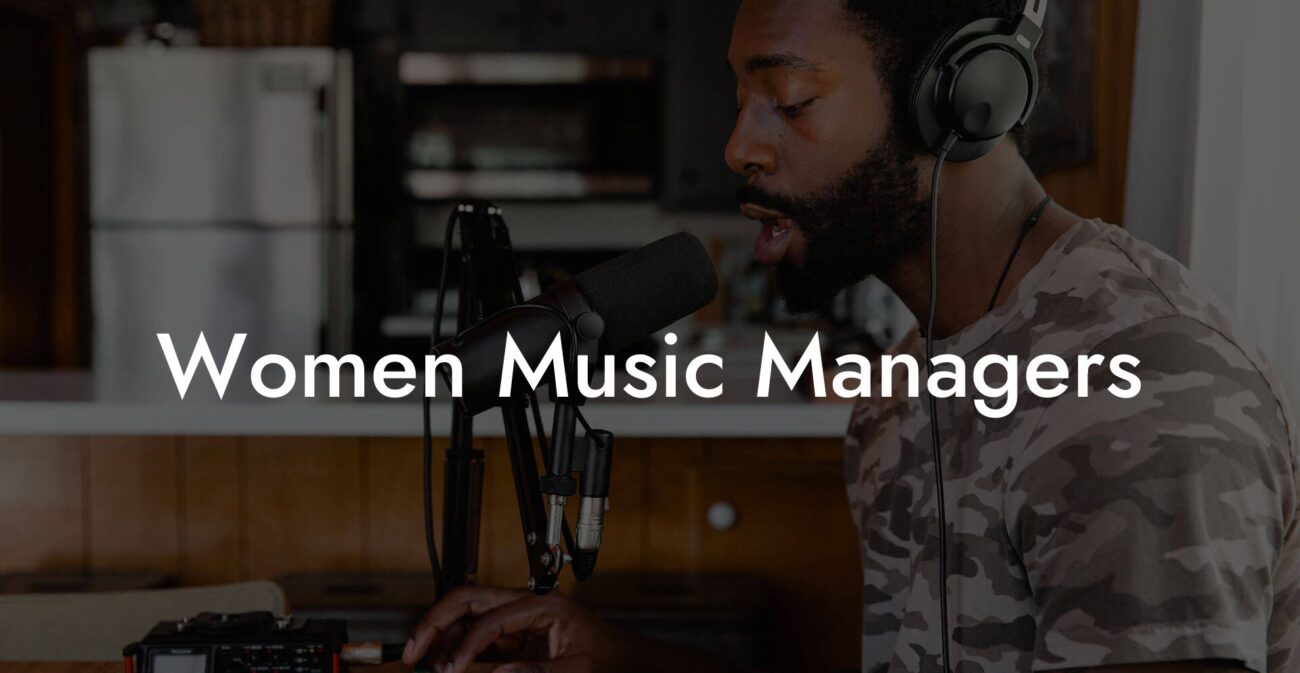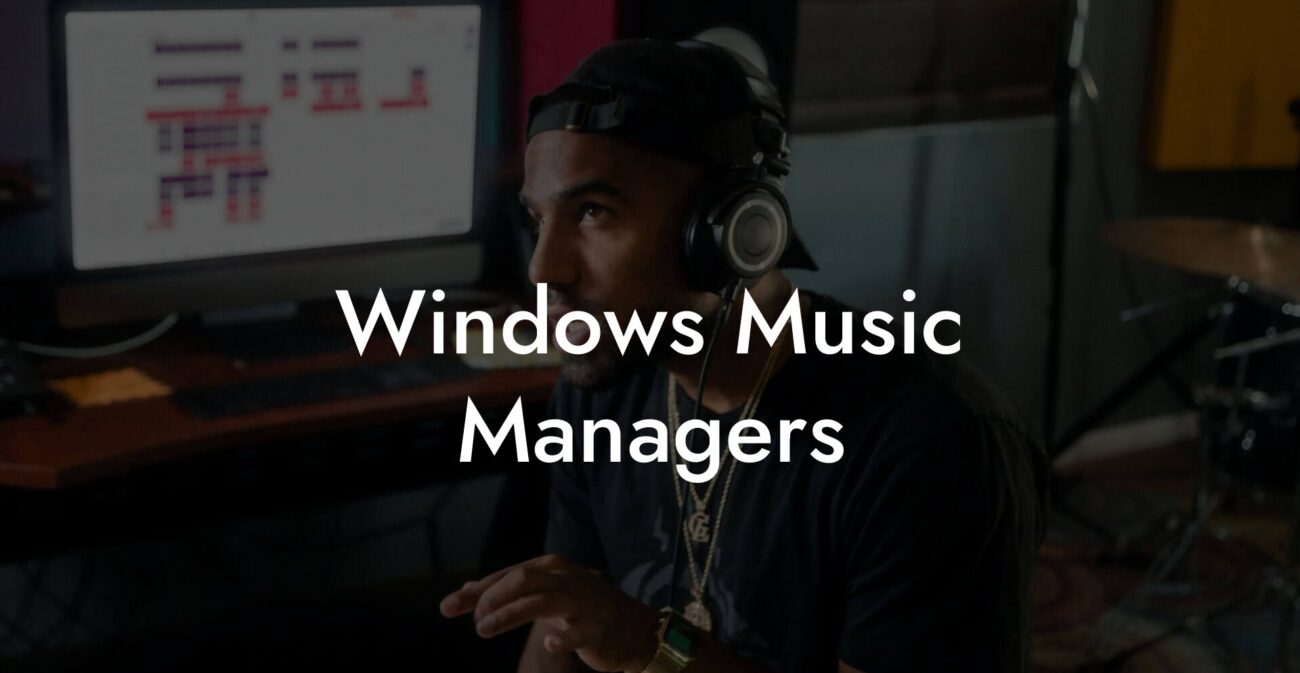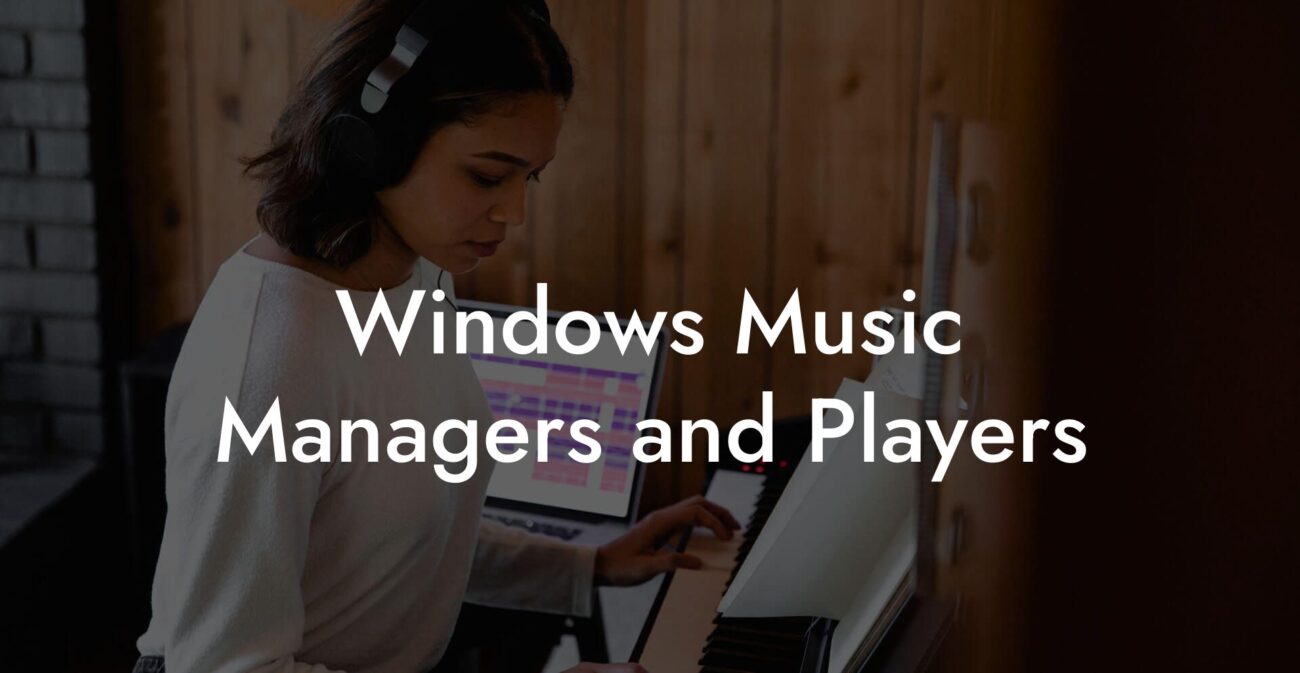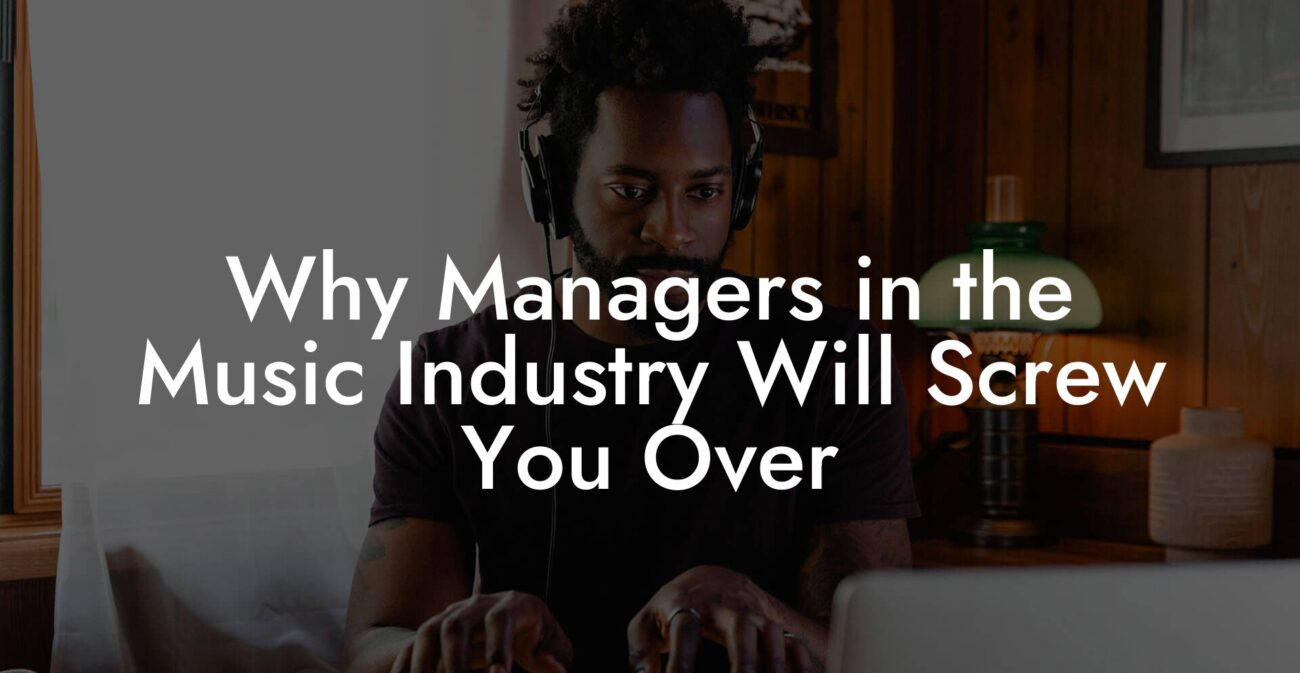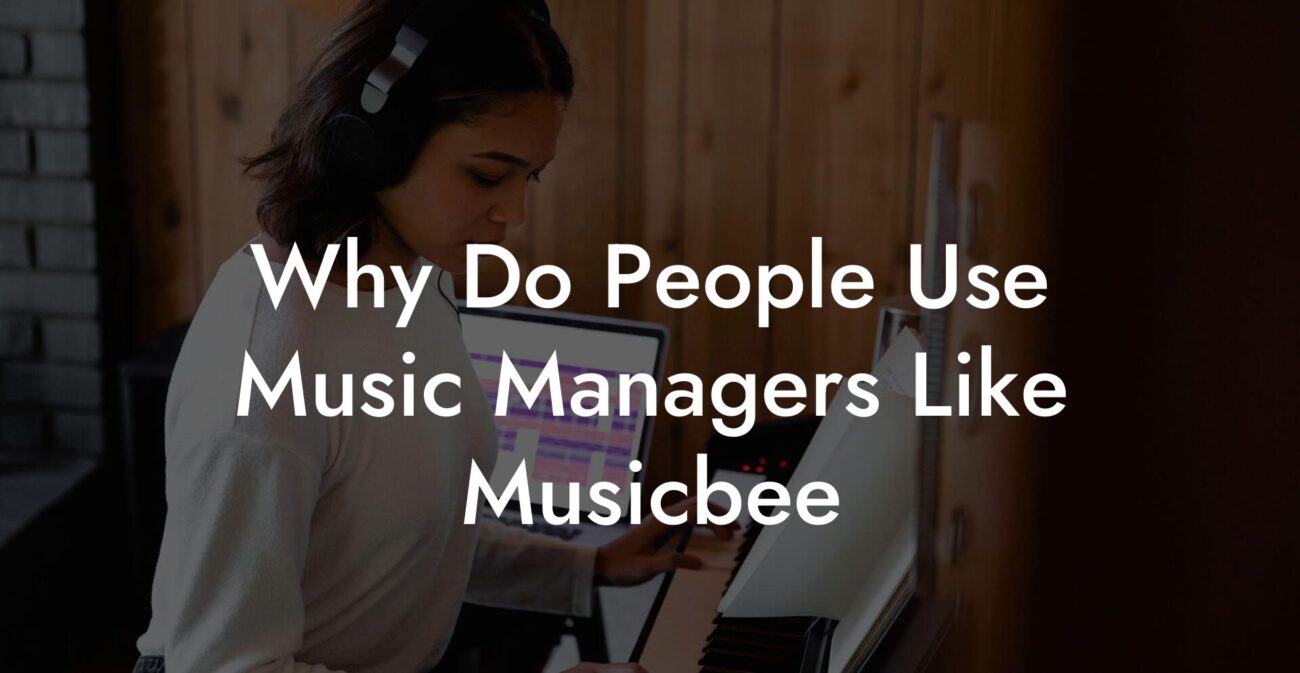Songwriting Advice
What Should Music Managers Know
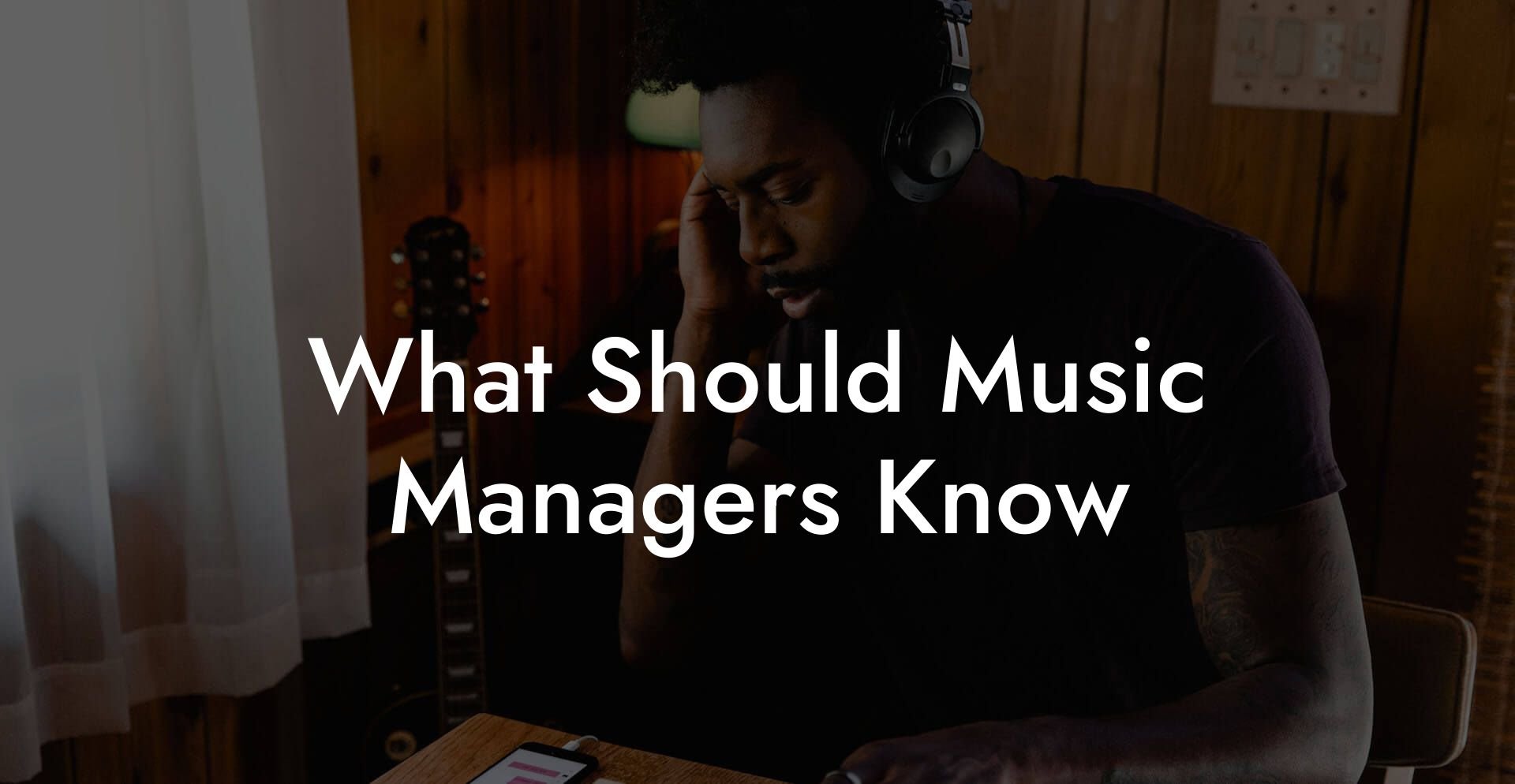
Ever wondered what it takes to be a music manager in today’s digital jungle? Picture this: you’re the quirky ringmaster behind the scenes, channeling the creative chaos of aspiring musicians and chart-topping songwriters while juggling streaming algorithms, social media trends, and the occasional meme-worthy moment. Welcome to "What Should Music Managers Know" – a no-nonsense, humor-packed guide designed for all you millennial and Gen Z trailblazers stepping into the vibrant realm of music management. Whether you're here to help artists craft the next big hit or to discover insider tips on how to navigate the music biz with a blend of savvy street smarts and cutting-edge tech like Lyric Assistant, this guide is your one-stop resource for transforming industry know-how into pure, unadulterated success.
Quick Interruption: Ever wondered how huge artists end up fighting for their own songs? The answer is in the fine print. Learn the lines that protect you. Own your masters. Keep royalties. Keep playing shows without moving back in with Mom. Find out more →
Quick Interruption: Ever wondered how huge artists end up fighting for their own songs? The answer is in the fine print. Learn the lines that protect you. Own your masters. Keep royalties. Keep playing shows without moving back in with Mom. Find out more →
Quick Links to Useful Sections
- The Evolving Role of a Music Manager in the Digital Age
- Core Responsibilities of a Music Manager: More Than Just a Paper Pusher
- Navigating the Music Industry: Trends and Tactics for the Modern Manager
- 1. Data-Driven Decisions (But With Heart)
- 2. Mastering Social Media Savvy
- 3. Partnering with Cutting-Edge Tools
- 4. Embracing the Rise of Independent Artists
- 5. Diversification: Beyond Music Releases
- Essential Skills for Music Managers: Building the Dream Team (That Is You!)
- Communication & Negotiation
- Strategic Thinking & Problem Solving
- Digital Fluency & Tech-Savvy
- Time Management & Organization
- Emotional Intelligence & Adaptability
- Best Practices for Music Managers: Elevate Your Game
- Establish Clear Goals and Milestones
- Invest in Continuous Learning and Networking
- Leverage Digital Marketing Strategies
- Utilize Technology to Streamline Creative Processes
- Embrace a Flexible and Adaptive Mindset
- Understanding the Music Business Landscape: Legal, Financial, and Contractual Know-How
- Legal Basics and Contract Negotiation
- Financial Management and Budgeting
- Intellectual Property and Copyrights
- Innovative Marketing Strategies: Amplifying Your Artist’s Voice
- Storytelling Through Content
- Influencer Collaborations and Brand Partnerships
- Live Virtual Events and Interactive Q&A Sessions
- Utilizing Data to Refine Campaigns
- How to Leverage Technology: Tools and Platforms to Boost Your Artist’s Career
- Digital Distribution Platforms
- Online Collaboration Tools
- Lyric and Composition Assistance
- Social Media and Analytics Tools
- Financial Planning and Monetization: Turning Passion into Profit
- Diverse Revenue Streams
- Budgeting for Growth
- Understanding Royalties and Rights
- Resources and Community Support: Your Next Steps
- Industry Workshops and Webinars
- Professional Networking Groups
- Music Business Publications and Podcasts
- Collaboration with Tech Providers
- Integrating Creativity and Strategy: Balancing Art With Business
- Music Management Case Studies: Real-World Success Stories
- Case Study 1: From Garage Band to Viral Sensation
- Case Study 2: Reinventing the Indie Artist With Data
- Case Study 3: Building a Brand With Authenticity and Innovation
- Building a Legacy: The Future of Music Management
- Music Management FAQs: Your Top Questions Answered
- Your Journey to Mastery in Music Management
The Evolving Role of a Music Manager in the Digital Age
Once upon a time, music managers were the mysterious puppeteers who handled booking gigs, managing finances, and keeping artists grounded amidst chaos. But in today’s fast-paced, tech-driven world, their role has morphed into a dynamic blend of creative director, digital strategist, and networked guru – all served with a generous side of meme culture.
Modern music managers are now tasked not only with traditional responsibilities like negotiating contracts and coordinating with agents, but also with understanding the intricate tapestry of social media algorithms, streaming data analytics, and digital marketing. From maximizing playlists and subscriber growth to leveraging social media trends and influencer partnerships, there’s no one-size-fits-all manual to follow. Instead, it’s about blending creative intuition with a deep understanding of modern technology.
And let’s be real, music management isn’t just about spreadsheets and schedule coordination. It’s about nurturing the artist’s brand, tapping into cultural shifts, and yes, even knowing when to drop a perfectly timed tweet or Instagram story. For those looking to help their artists write those soul-stirring lyrics effortlessly, integrating innovative tools like Lyric Assistant into your strategy can make the artistic process smoother, more creative, and just downright fun.
Core Responsibilities of a Music Manager: More Than Just a Paper Pusher
If you’re picturing a music manager as someone who only handles the administrative side of the business, think again. Here are the fundamental responsibilities that every kickass music manager should master:
- Artist Development & Branding: Guiding your artist’s evolution by crafting a compelling brand identity, both visually and sonically, to truly resonate with target audiences.
- Career Strategy & Road Mapping: Creating clear, actionable plans that not only help your artist grow their fan base but also secure long-term success in a competitive market.
- Booking & Tour Management: Coordinating gigs, live performances, and tours with finesse, ensuring every show is a well-orchestrated event that amplifies your artist’s reach.
- Contract Negotiation & Business Liaison: Acting as the go-to negotiator on deals, endorsements, and partnerships, while safeguarding your artist from shady offers.
- Digital Marketing & Social Media Strategy: Harnessing the power of platforms like Instagram, TikTok, and YouTube to promote music, foster fan engagement, and build momentum for every release.
- Financial Oversight: Keeping a keen eye on budgets, revenue streams, and expense management to ensure sustainability in your artist’s career.
In a nutshell, the modern music manager is a multi-tasking dynamo who not only hones the creative fire of an artist but also strategizes behind the scenes to turn passion into profit.
Navigating the Music Industry: Trends and Tactics for the Modern Manager
The music industry is an ever-changing landscape, where the line between the digital and physical worlds is blurring faster than you can say “viral hit.” Let’s walk through some of the key trends and tactics that savvy music managers use to stay ahead of the curve:
1. Data-Driven Decisions (But With Heart)
In a world where streaming platforms provide endless data, understanding analytics is as indispensable as your morning coffee. Music managers dive into playlists, listener demographics, and algorithmic insights to pinpoint which tracks are resonance magnets. But remember, while data tells you what’s hot, the human touch tells you why it matters. Merging numbers with intuition creates a blueprint for success that’s both measurable and meaningful.
2. Mastering Social Media Savvy
Social media isn’t just about likes and retweets, it’s a dynamic stage for storytelling, connection, and community building. Music managers must become adept storytellers, curating content that underscores the artist’s journey and vibe. Whether it’s behind-the-scenes footage, candid studio sessions, or quirky banter that fans can’t get enough of, the digital narrative is your secret weapon.
3. Partnering with Cutting-Edge Tools
Tools like Lyric Assistant are not only revolutionizing music creation but are also key allies for managers plotting the next big anthem. By helping artists effortlessly create stirring lyrics, these platforms free up creative energy to focus on higher-level branding and strategy. Get ready to merge art with innovation, making the entire creative process a collaborative dance.
4. Embracing the Rise of Independent Artists
With barriers to entry lowered by digital platforms, independent artists are rewriting industry rules. Music managers now often double as entrepreneurial mentors, helping these indie talents navigate self-promotion, crowdfunding, and direct-to-fan marketing. Emphasize authenticity and niche appeal, they’re the brew that makes an independent act memorable in a sea of mainstream sound.
5. Diversification: Beyond Music Releases
The modern music career is a multifaceted venture. Think merchandise drops, branding partnerships, sponsored content, and even virtual concerts. Your role is to not only manage these income streams but to integrate them into a coherent brand narrative. The art of diversification means you’re not putting all your monetary eggs in one digital basket, thus safeguarding the artist’s livelihood amidst unpredictable industry shifts.
Essential Skills for Music Managers: Building the Dream Team (That Is You!)
To thrive in this fast-paced, endlessly creative industry, music managers need a unique skill set that blends business acumen with creative flair. Here are the must-have skills to sculpt your career:
Communication & Negotiation
Whether it’s negotiating a fair deal with a record label or maintaining clear, empathetic communication between you and your artist, mastery in this area is paramount. An effective music manager speaks the language of creativity while firmly handling the business side with confidence.
Strategic Thinking & Problem Solving
You must be a visionary with the uncanny ability to chart out your artist’s career roadmap while simultaneously troubleshooting the inevitable hiccups along the way. It’s like a never-ending game of chess, only with more beats and fewer knights in shining armor.
Digital Fluency & Tech-Savvy
The digital revolution has redefined the music business: stream analytics, social media platforms, and lyric generation software are now essential tools in your arsenal. Embrace these technologies not as obstacles but as exciting opportunities to connect more deeply with fans and optimize every release.
Time Management & Organization
Juggling multiple projects, meetings, and creative sessions demands sharp organizational skills. Using digital project management tools, calendars, and reminders can help keep those deadlines in line, ensuring nothing slips through the cracks.
Emotional Intelligence & Adaptability
In an industry defined by creative passion and unpredictability, being able to empathize and adapt is as important as hitting the right note. Whether you’re navigating the highs of a viral success or soothing the lows of a creative slump, your ability to balance emotional support with practical decision-making sets true leaders apart.
Best Practices for Music Managers: Elevate Your Game
Now that you’re familiar with the underlying principles of music management, it’s time to dive into some concrete strategies that can elevate your game:
Establish Clear Goals and Milestones
A roadmap is only as good as its destination. Set specific, measurable goals for your artist’s career, from streaming numbers to gig bookings, and break them down into manageable milestones. This approach not only keeps progress on track but also allows you to celebrate those hard-earned wins.
Invest in Continuous Learning and Networking
The music industry is continually evolving, which means you must remain curious and well-informed. Attend industry conferences, join online forums, and subscribe to music business publications. Networking isn’t just about collecting business cards; it’s about forging authentic relationships that can open doors to collaborations, partnerships, and innovative opportunities.
Leverage Digital Marketing Strategies
In today’s digital-first environment, mastering online marketing techniques is crucial. Develop robust social media campaigns, build a compelling website, and harness the power of email newsletters to keep your artist’s fanbase engaged. Think of every platform as a stage, each with its own audience waiting to be captivated by your artist’s unique sound.
Utilize Technology to Streamline Creative Processes
Efficiency in creativity is not a paradox, it’s a necessity. Tools like Lyric Assistant can drastically reduce the burden of writer’s block, ensuring that your artist’s lyrical content is as crisp and dynamic as their performance. Embrace technology to handle repetitive tasks, allowing more time for strategic planning and creative brainstorming.
Embrace a Flexible and Adaptive Mindset
In an industry that can pivot on a dime, flexibility is critical. Be open to trying new approaches, re-evaluating strategies, and even learning from unexpected failures. It’s this adaptability that often marks the difference between surviving the ups and downs of the music world and truly thriving.
By implementing these best practices, you’re not merely managing an artist’s career, you’re crafting a dynamic ecosystem where creativity and commerce coexist in perfect harmony.
Understanding the Music Business Landscape: Legal, Financial, and Contractual Know-How
Behind every chart-topping hit is a labyrinth of legalities, contracts, and financial maneuverings that make sure the gears of the music industry keep turning. As a music manager, having a foundational understanding of these elements is as essential as that morning espresso shot.
Legal Basics and Contract Negotiation
Contracts are not just dusty legal documents, they’re the lifeblood of the music industry. Familiarize yourself with key terms such as royalties, advances, licensing rights, and distribution deals. Knowing how to negotiate these clauses can be the difference between a fair deal and a financial nightmare. When in doubt, always consult with a specialized entertainment attorney who can offer critical insights and safeguard your artist’s interests.
Financial Management and Budgeting
From tour expenses to studio recordings, every facet of an artist’s career has a price tag attached. A savvy music manager must not only secure revenue streams but also meticulously plan budgets to ensure sustainable growth. Whether it’s analyzing cash flow or allocating funds for marketing campaigns, financial literacy is a non-negotiable skill.
Intellectual Property and Copyrights
In the digital age, protecting creative output is paramount. Understanding the basics of copyrights, trademarks, and intellectual property rights can help shield your artist’s work from exploitation. This knowledge positions you to better negotiate agreements and secure the creative integrity of your projects.
With a robust legal and financial foundation, you can confidently steer your artist’s career through the often murky waters of the music business, ensuring that both creative vision and commercial savvy are in perfect sync.
Innovative Marketing Strategies: Amplifying Your Artist’s Voice
In today’s hyper-connected world, launching a hit record does not simply happen by chance, it’s the result of a meticulously planned and executed marketing strategy that resonates with fans on a personal level. Here are some innovative marketing strategies every visionary music manager should have in their playbook:
Storytelling Through Content
Every artist has a story, and weaving that narrative into your marketing is like turning a regular campfire tale into an epic saga. Utilize blogs, behind-the-scenes video content, and interactive social media posts that reveal the artist’s creative process, personal journey, and even the occasional quirky moment in the studio. Authenticity builds loyalty.
Influencer Collaborations and Brand Partnerships
Partnering with influencers who share a common audience can amplify your artist’s reach in ways that traditional marketing can only dream of. Whether it’s an Instagram takeover or a TikTok challenge, aligning your artist with influencers can create a buzz that drives streams, sales, and social engagement.
Live Virtual Events and Interactive Q&A Sessions
Virtual concerts, live-stream Q&A sessions, and interactive listening parties are no longer niche; they’re the new norm. These events create a personal connection, offering fans a front-row seat to your artist’s world while allowing real-time interaction to foster a sense of community.
Utilizing Data to Refine Campaigns
Dive deep into analytics: understand your audience’s demographics, interests, and habits. Use this data to tailor your marketing campaigns down to the finest detail. Small adjustments based on real insights can lead to big results, transforming a one-hit wonder into a sustained phenomenon.
By innovating your marketing strategies with a blend of creative storytelling and data-driven insights, you elevate your artist’s presence, ensuring that every new release lands with maximum impact.
How to Leverage Technology: Tools and Platforms to Boost Your Artist’s Career
Technology is the new backbone of the music industry, empowering both artists and managers to break boundaries and explore fresh horizons. From digital distribution to sync licensing and everything in between, here’s how you can leverage technology for career growth:
Digital Distribution Platforms
Platforms like Spotify, Apple Music, and emerging services are essential channels for getting your artist’s music out to the world. Optimizing playlists, creating exclusive content, and using curated data help ensure that your music isn’t just heard, it’s celebrated.
Online Collaboration Tools
Remote working and virtual collaborations have opened up a world of possibilities. Cloud-based production suites, online file sharing, and project management apps streamline the creative process, allowing you to coordinate seamlessly with producers, songwriters, and visual artists.
Lyric and Composition Assistance
One of the most exciting tech innovations for today’s musicians is artificial intelligence-powered songwriting assistance. With tools like Lyric Assistant by your side, creating compelling, emotionally resonant lyrics becomes a breeze. This technology not only accelerates the creative process but also allows artists to experiment with new ideas, breaking free from the creative rut.
Social Media and Analytics Tools
Stay on top of your game with platforms that provide insights into audience engagement, track trending topics, and help schedule posts at peak times. Tools that integrate social listening with analytics ensure that you’re always a step ahead in crafting strategies that resonate with fans.
By embracing technology, you position your artist at the forefront of a digital revolution, merging creativity with innovation to create music that not only sounds great but also reaches the right ears.
Financial Planning and Monetization: Turning Passion into Profit
Every beat, lyric, and performance has the potential to generate revenue, if you know how to harness it. Financial planning isn’t just about penny-pinching; it’s about strategically investing in your artist’s future while monetizing every aspect of their career.
Diverse Revenue Streams
In today’s music economy, revenue comes from multiple channels: streaming, live performances, merchandise, endorsements, sync placements, and more. As a music manager, map out diversified revenue streams to protect against industry fluctuations. The more sources of income, the less vulnerable your artist is to market shifts.
Budgeting for Growth
Effective budgeting is key to balancing creative freedom with smart investments. Allocate funds for marketing, production, touring, and new equipment thoughtfully. Use financial planning tools and consultation with industry experts to ensure every dollar is working hard towards boosting your artist’s profile.
Understanding Royalties and Rights
Royalties can be a complex maze, from performance royalties to mechanical rights, but understanding the basics enables you to secure earnings for your artist. Stay informed about new streams of revenue such as digital licensing deals and performance synchronization in ads and films.
Sound financial planning transforms raw passion into a sustainable, profitable career, allowing your artist to create and innovate without the constant pressure of financial strain.
Resources and Community Support: Your Next Steps
In an industry as multifaceted as music, partnering with like-minded professionals and tapping into supportive communities is paramount. Here’s a snapshot of the resources and networks that can help you not only sharpen your skills but also expand your reach:
Industry Workshops and Webinars
Keeping up with the latest trends is as simple as enrolling in online courses, webinars, and workshops. Many of these resources are free or low-cost and generously share insights on digital marketing, legal issues, and emerging tech in music.
Professional Networking Groups
From local meetups to global online forums, networking groups open doors to mentorship, collaboration, and business opportunities. Whether it’s a Facebook group for indie music managers or a LinkedIn community for entertainment professionals, these platforms provide invaluable connections.
Music Business Publications and Podcasts
Knowledge is power, and a steady diet of music business blogs, magazines, and podcasts can keep you on the cutting edge. Look for resources that dissect industry trends, profile successful managers, and offer actionable tips for breaking into the business.
Collaboration with Tech Providers
Tools like Lyric Assistant not only streamline the creative process but also often come with communities of users sharing tips, success stories, and creative hacks. Dive into these forums and discussions to harness the full potential of the technology at your disposal.
Leverage these resources to build a support ecosystem around you. The music management journey is as much about collaboration and shared learning as it is about individual brilliance.
Integrating Creativity and Strategy: Balancing Art With Business
At its core, music management is the art of balancing creativity with strategy. It’s about nurturing the free-spirited muse within your artist while ensuring every creative impulse aligns with a well-formulated business strategy.
Rather than stifling ingenuity with endless meetings and numbers, aim to create an environment where creativity is supported by smart strategy. Foster open communication with your artist about their artistic vision and align it with actionable business goals. The result? A collaboration that not only leads to innovative music but also to the kind of long-term career growth that industry legends are made of.
Remember, managing a burgeoning music career is a lot like curating a masterpiece. It demands a delicate interplay between risk-taking and calculated moves, between soulful inspiration and marketing analytics. When you marry the raw power of creativity with the structured precision of business strategy, you set the stage for transformative success.
Music Management Case Studies: Real-World Success Stories
The concept of music management is best understood through the lens of real-life triumphs. Let’s explore a few case studies that bring theory and practice together:
Case Study 1: From Garage Band to Viral Sensation
Imagine a scrappy indie band that once played gigs at dive bars and open mics. Their breakthrough moment came not just from a catchy tune, but from a music manager who harnessed social media heat, optimized streaming playlists, and even integrated Lyric Assistant to polish their songwriting. By blending digital strategies with grassroots promotion, the band went viral, turning their small local following into millions of worldwide streams.
Case Study 2: Reinventing the Indie Artist With Data
In another inspiring story, a music manager used detailed analytics and digital marketing campaigns to transform an experimental indie artist’s career. By tracking listener trends and leveraging targeted social media ads, the artist was able to find a niche audience that resonated deeply with their unique sound. Smart budgeting and diversified revenue streams eventually catapulted them into a sustainable, long-term career.
Case Study 3: Building a Brand With Authenticity and Innovation
One standout career was propelled by a manager who built an authentic brand around the artist’s personal story. By curating a compelling narrative through creative digital content, influencer partnerships, and live interactive events, the manager not only captured the hearts of fans but also attracted lucrative brand endorsements. Strategic use of tech tools like Lyric Assistant allowed the artist to consistently deliver fresh, engaging content, proving that honesty and innovation are a winning combination.
These case studies illustrate that effective music management can turn potential into powerhouse careers, showing just how transformative a blend of creativity, technology, and strategy can be.
Building a Legacy: The Future of Music Management
As technology revolutionizes the music industry, the future of music management lies in the ability to adapt, innovate, and effectively blend artistic passion with business strategy. The role of the music manager is evolving, becoming more collaborative, tech-driven, and deeply integrated with the nuances of digital culture.
Looking ahead, emerging trends such as virtual concerts, blockchain-based royalty tracking, and enhanced fan engagement through AR/VR experiences are poised to redefine the industry. Music managers who embrace these changes now will be the trailblazers shaping the next era of music.
The key takeaway? Never stop learning, experimenting, or connecting. The landscape of music is as unpredictable as it is exciting, and the journey of a music manager is just beginning. By staying attuned to new technologies, nurturing authentic relationships, and always putting creativity at the forefront, you’ll be more than ready for whatever the future holds.
Music Management FAQs: Your Top Questions Answered
Here are some of the most frequently asked questions from aspiring music managers and industry enthusiasts. We’ve compiled answers that cut through the noise and provide clear, actionable insights.
1. What exactly does a music manager do?
A music manager oversees an artist’s career by handling aspects like branding, marketing, booking gigs, negotiating contracts, and guiding overall strategic growth. They act as a liaison between the artist, record labels, and other industry professionals.
2. How important is digital marketing in music management?
Digital marketing is crucial. From social media campaigns to data-driven insights and influencer partnerships, leveraging digital tools can significantly expand an artist’s reach and engagement.
3. Can tools like Lyric Assistant really enhance an artist’s creative process?
Absolutely. AI-based tools like Lyric Assistant help streamline the songwriting process, reduce creative blocks, and provide inspiration for fresh, engaging lyrics, allowing the artist to focus more on performance and less on wrangling words.
4. What are some key skills every music manager should develop?
Essential skills include strong communication, negotiation, digital fluency, strategic thinking, and emotional intelligence. Being adaptable and open to learning are also critical in this fast-changing industry.
5. How do I balance creativity with business strategy?
The balance is achieved by fostering open communication with the artist, setting clear goals, and integrating creative insights with data-driven decisions. It’s all about creating an environment where innovation and strategy work hand in hand.
6. What are the emerging trends in music management?
Emerging trends include virtual concerts, AI-driven analytics, blockchain for transparent royalty management, and increased emphasis on direct-to-fan content. Keeping up with these trends is key for long-term success.
7. How do music managers support independent artists?
Music managers help independent artists gain visibility, secure gigs, optimize digital marketing, and diversify revenue streams, all while maintaining the artist’s authentic brand voice.
8. Is networking really important in the music business?
Yes, networking is essential. Building genuine relationships with industry professionals, influencers, and other managers opens doors to collaborations, partnerships, and new opportunities that are crucial for career growth.
9. What should I look for in a contract as a music manager?
Look for clear terms on royalties, advances, rights, and obligations. It’s always wise to consult with an entertainment lawyer to ensure that the contract protects both the artist and your management interests.
10. How can I stay updated on the latest industry trends?
Regularly engage with industry publications, attend workshops and webinars, participate in networking events, and follow influential figures and tech trends on social media.
Your Journey to Mastery in Music Management
The world of music management is an ever-evolving tapestry, interlacing creative passion with razor-sharp strategy and cutting-edge technology. As you embark on your journey, remember that every challenge is an opportunity, every new technology a potential game-changer, and every artist’s success a reflection of your vision and dedication.
Whether you’re the manager of an up-and-coming indie band or guiding a solo artist on their path to becoming the next big thing, your role is as critical as the music itself. Embrace the dynamism of the industry, nurture innovative ideas, and stay relentlessly curious. Your ability to blend creativity with business savvy will not only elevate your career but also shape the soundscape of tomorrow.
So, gear up, dive into the myriad of resources and communities available, and let your passion for music management drive every decision. Your journey is the ultimate remix, a fusion of experience, innovation, and heart that transforms raw talent into a legacy of sound.
Welcome to the adventure of a lifetime. The stage is set, the lights are on, and your next big move is just around the corner. Now, go out there and make some noise!



